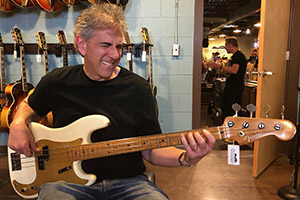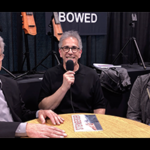Somewhere, there’s a bass just for you
By Jon Liebman
August 25, 2023
It happens all the time. Someone decides to learn bass and gets all excited. He or she may have a few bucks to spare and they’re tempted to go out and buy something pretty high level. And expensive.
But is all that really necessary?
In a word, no. Even a big-time bassist with a world-famous rock band doesn’t necessarily need to spend a fortune on gear. But that’s another story…
Start simple
Basically, it all comes down to whatever you need. And when you’re just getting started, you really don’t need all that much.
Recently, I was talking to Rob Turner, founder of EMG pickups, in a conversation published as this week’s FBPO interview.
Also taking part in the discussion was Jim Reilly, author of the just-released biography, Chasing Tone: How Rob Turner and EMG Revolutionized the Guitar’s Sound (awesome book!)
We talked a lot about tone, of course. I also asked Rob what advice he had for someone who’s learning bass and isn’t sure what kind of instrument to get.
Here’s what you need
“Well, the first thing I would do is find a bass that you like to play,” Rob says. “You need an instrument that you’re comfortable with. And if you have more than one, then you’re blessed. That’s the only way that you can really look at it in the first place.”
Great point, I thought. Don’t make it any harder than it is.
After all, your primary focus should be learning how to fulfill the role of the bass player, which means learning how to lock in with the drummer, set the foundation for the band, and make the music feel good.
Good news
Sure, you’ll need to develop a certain amount of technical proficiency and learn some music theory basics along the way, but the good news is: You don’t have to spend a fortune to do that. For as little as a few hundred dollars or less, you can get a decent bass that feels good, sounds good, and gets the job done.
Ibanez makes some great inexpensive basses. Sire basses are very popular too. And you definitely won’t go wrong with a Fender Jazz or Precision. Go to your local music store or check out Sweetwater or Guitar Center. Somewhere, there’s a bass for you.
Eventually, should you decide that you want something specific, like a 5-string or a fretless, for example, you can always upgrade once you know what you want.
Technique may be a factor too
“And it depends on whether a guy plays with a pick or not,” Rob says, “whether he plays with his thumb or whether he plays with one or two fingers. You know, what his technique is like. Those are the things that I sort of listen to. There’s a Jack Casady and there’s a Duck Dunn. You figure it out!” he says, laughing.
When you’re first learning bass, don’t get hung up on what kind of bass you need, or how many basses to buy. My advice is to start simple, with a decent, inexpensive bass. Once you get into it, you can always move up.
How about you?
What kind of experience have you had in deciding what kind of bass to buy? Leave a comment below and let me know. In the meantime, check out my interview with Rob and Jim here.





I started bass on a 6 string. Later I evolved to an cheap, inexpensive piece of junk , but I learned how to use my fingers to play and some of the dynamics of a real bass.
The next year, we all (band) upgraded and I got me a Rickenbacker, 1964, 4001.
Which I have MANY regrets selling, as I thought I was DONE
I still wanna cry over that!
For me it what’s my paper routes could afford.
It was a cheap bass and amp. But I loved it. It did the job.
It was hard to play, the string action was very high, but I didn’t know the difference. A year or so later, once I got enough bread together, I got a used Fender Precision and a Bassman amp, head with 2 x 12 cab. It was like playing butter, thanks to that first beast. This was around late ’65, early ’66. I still have it, but do not take it out of the house anymore. No it’s not for sale.
Awesome read this one. I remember after having sold everything and then decided to get back to playing after many years having to decide what to buy. Bought a Peavy and then right away some EMG pickups. Now my Fender P/Deluxe and Musicman work just fine.
Having bought my first guitar 60+ years ago, here’s how I do it. Sit down with an instrument and play it. If you don’t feel very comfortable with, put it down and move on. IF it makes you want to sit and play it, consider buying it. Same with amps. If you plug in and find yourself twisting the knobs into weird positions, move on. (Tweaking is ok.) IF you don’t get your sound straight out of the unit, it’s not right for YOU. The instrument/amp should make you want to play. Don’t buy something because of a magazine or on-line review or because some famous person uses it. Buy it for you.
I play with two fingers. My style is a southern gospel, bluegrass style.
In the late 90s, I bought a Warmoth 5-string with EMG pick-ups that became my gig bass until I moved to Texas and bought my first Elrick with Bartolini pickups. The EMGs sounded good, but since the preamps were built into the pickups, when the battery died, so did the bass. Had a couple of unfortunate on-stage occasions. The Bartolini preamp can be by-passed on the fly with a switch which has saved me embarrassment several times.